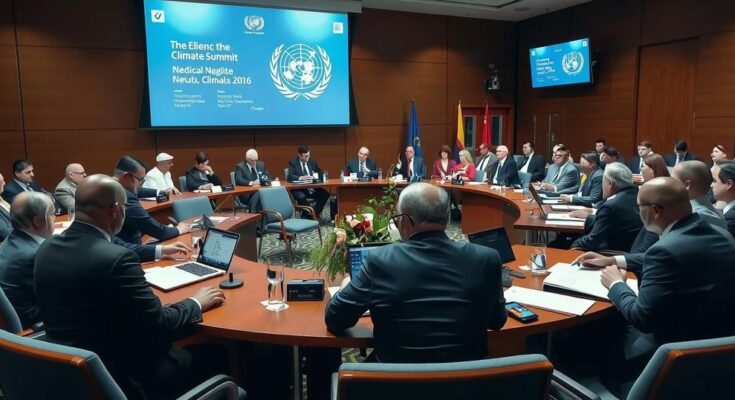The climate summit in Baku is focused on securing funding for developing countries to transition from fossil fuels and adapt to climate change. UN officials urge negotiators to prioritize actionable agreements, while the need for approximately $1 trillion in climate financing remains disputed. Activists criticize wealthier nations for seeking shared financial burdens from emerging economies, which may distract from their obligations. Concurrent talks at the G20 summit emphasize climate change among other global issues, reinforcing the urgency for comprehensive financial commitments from historical emitters.
At the ongoing United Nations climate summit in Baku, Azerbaijan, discussions have entered their second week with a strong emphasis on advancing negotiations surrounding financial support for developing countries. During a session on Monday, UN Climate Change Executive Secretary Simon Stiell urged negotiators to move past theatrics and focus on substantive discussions to find common ground among nations. The primary objective remains to secure significant funding for vulnerable nations to transition from fossil fuels and adapt to climate-induced weather extremes. Climate ministers have arrived to accelerate the dialogues, though significant disparities exist concerning the amount of financing required. Recent estimates suggest that developing countries may need up to $1 trillion in climate financing. While wealthier nations advocate for shared financial commitments from emerging economies, critics like Teresa Anderson from ActionAid International question the motives behind such proposals, suggesting they may serve to distract from rich countries’ responsibilities. Furthermore, Rachel Cleetus from the Union of Concerned Scientists asserted the urgency of addressing climate funding, stating that future generations may see a $1 trillion investment as a modest expense given the rising frequency of costly climate-related disasters. Amid these negotiations, world leaders are convening at the Group of 20 summit in Brazil where climate change will be a pivotal issue, alongside pressing challenges such as escalating global conflicts and poverty. Harjeet Singh from the Fossil Fuel Non-Proliferation Treaty Initiative emphasized the need for G20 nations to acknowledge their historical emissions and fulfill their financial obligations to combat climate change. Additionally, meetings at the OECD are underway to discuss restrictions on public funding for foreign fossil fuel projects, potentially curtailing up to $40 billion in emissions-causing initiatives. Activists continue to challenge key nations, urging the Biden administration to take decisive action to solidify agreements against fossil fuel financing, something crucial for President Biden’s long-lasting impact on climate policy.
The climate summit in Baku, Azerbaijan, follows a series of international efforts to address the challenges posed by climate change, particularly highlighting the disparity in financial resources between developed and developing nations. Historically, developing countries have sought assistance from wealthier nations to combat climate change effects and facilitate a transition toward sustainable energy solutions. As the impact of climate change escalates through extreme weather events, the need for substantial financial commitments becomes urgent to enable vulnerable nations to adapt and recover from environmental crises. This summit is significant as it involves some of the world’s largest economies discussing their respective roles and financial responsibilities in combating climate change, while also navigating the complexities of international negotiation dynamics.
The negotiations at the Baku climate summit illustrate the global urgency in addressing climate change, specifically through financial aid for developing nations. With estimates indicating a potential need of $1 trillion for climate funding, the discussions highlight a crucial moment in climate diplomacy where rich countries are urged to assume greater responsibility. As activists call for action from major powers such as the United States, the outcomes of this summit may have far-reaching implications for future climate agreements and the effectiveness of international collaborations in combating environmental threats.
Original Source: www.bostonglobe.com




